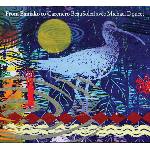 After 37 years as globe-trotting Cajun ambassadors, there are not many unconquered frontiers left for BeauSoleil. Caribbean/world music has a strong presence here on its 25th album, though it’s not necessarily new ground—They did it on 1989’s Bayou Cadillac. Buy on Amazon
After 37 years as globe-trotting Cajun ambassadors, there are not many unconquered frontiers left for BeauSoleil. Caribbean/world music has a strong presence here on its 25th album, though it’s not necessarily new ground—They did it on 1989’s Bayou Cadillac. Buy on AmazonBuy on iTunes
But what’s astounding is how familiar ground can be revisited and still sound remarkably fresh. A good portion of the proceedings sweep through a worldwide Creole odyssey that starts with the enchanting “La Douceur,” a melody found in many Louisiana Creole tunes, and ends at Canray Fontenot’s “Les Barres de la Prison” featuring Michael Doucet’s descending, yet novel fiddle lines. In between, two songs loosely symbolize a Diaspora of sorts. The shuffling modern composition “Bamako,” the Malian capital in the West African region of the Creole ancestral homeland, marks the beginning while “Carencro” could be thought of as the end. The arrangements are beyond the traditional dancehall-centric variety but are more stringband world music-oriented, embellished by guest Don Vappie’s banjo, mandolin and artistic basslines, David Doucet’s bright ukulele and percussionist Billy Ware and drummer Tommy Alesi’s Caribbean-based foundation.
The other prevailing theme is how Cajun musicians have always fused outside styles and influences into the repertoire and made ‘em their own. But instead of translating a tear-in-your-beer country hit or a banal pop song, BeauSoleil snags the deeper cuts. The crazy swing of John Coltrane’s “Bessie’s Blues” is BeauSoleil cranked on Hot Club while James Brown’s “I’ll Go Crazy” is a rollicking tour de force with guest accordionist Corey Ledet’s whirling rides. “You Got to Move” from bluesman Mississippi Fred McDowell becomes a French dirge with rolling snare and infectious gospel voices. Though two Cajun songs (“Two-Step de Port Arthur,” “Guilbeau Pelican & Napoléon’s Reel”) bookend the proceedings, everything else illustrates how far a branch can grow.



